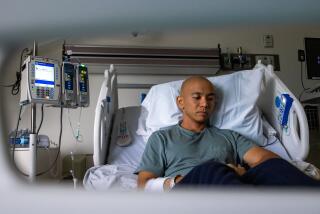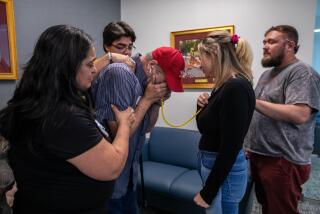Liver Transplants Pose Dilemmas for Parents, Experts
- Share via
It was touch and go, life and death, minute to minute last week, as Becky Dominguez waited for a liver for her baby, Alex.
In plain language, that meant that another, healthy baby would have to die of trauma, and the parents would have to donate their child’s liver so that Alex could live.
“If she doesn’t get it . . . we don’t know,” Dominguez said. “She’s in acute liver failure. She’s not bleeding now, but any minute she could start. I feel like I’m sitting on top of a bomb.”
Dominguez was holding her baby close as she spoke. The 7-month-old girl with huge brown eyes had tubes and wires dangling from her tiny body in the UCLA hospital room where the mother and daughter had waited for three weeks.
“I never thought I’d come to the point where I am praying she can have this surgery,” Dominguez said, “but we have no other options.”
But during Dominguez’s long vigil, an option seemed to open up as news spread of two historic surgeries in Chicago.
A mother whose baby had the same disease as Alex had donated part of her own liver to her child in America’s first live-donor liver transplant. Then, a father underwent the same procedure. It was, the media reported, a risky operation for the donors.
But Becky Dominguez says she knew--instantly--that she, too, would put her life on the line to save her child, if her doctor said it was possible.
She was not alone. Physicians like Alex’s doctor--Ronald W. Busuttil, professor of surgery and chief of liver transplantation at UCLA--reported that their phones have been ringing off the hook with parents wanting to know if the live-donor liver transplant procedure was possible for them and their children.
Though the callers seemed unconcerned about the risks to themselves, Busuttil and other experts offered concerns about the psychological effects of an operation in which healthy parents may have to risk their lives to donate an organ to save their children.
Until now, bone marrow and kidneys have been most often donated from the living. But these procedures were considerably less risky for the donor than the new liver transplant, Busuttil says.
“I’m sure it’s an overwhelmingly positive feeling for a parent who is able to donate an organ,” he says. “They are performing the ultimate act of altruism, next to actually laying down one’s life.
“But there’s a caveat to that,” he says. “The intense pressure that this can place on a parent may also cause a tremendous amount of irreparable psychological upheaval.
“While it’s easy to say that every parent wants to lay down his or her life for his child,” that is not necessarily so, he asserts. If these operations were to become routine, some parents would feel obliged to have them because they’d feel guilty if they didn’t offer.
Busuttil says one parent came to him about the Chicago operation; she heaved a big sigh of relief when told that she couldn’t donate.
“In fact, she said she’s glad we’re not doing the operation here because she wouldn’t be faced with the decision,” he recalls, adding that he fears some parents might feel compelled to say yes to the operation when they really mean no.
Dominguez shivers when told what the doctor has said. She has been at her daughter’s side, in and out of hospitals, since Alex was born. Her husband, Tony, a Los Angeles County firefighter, her mother and other family members have been tending to the Dominguez’s two other daughters, Morgan, 8 and Erin, 5.
“I’m so lucky to have this big, caring family,” she says. “I don’t know how other families can do it, because my two children at home really need me. They just smother me and hang on me when they see me. I’m torn between the two places, home and here. But this is the child who needs me physically to be here.”
She says that “the waiting room here is full every night. I just didn’t realize how many kids are waiting for transplants. And the other mothers are so tormented. They don’t want to leave their children who are here, yet they can’t leave their other kids at home alone.”
Add to this the possibility that these parents might lose their own health if someday they have the option to donate a part of their liver, and the choices become even harder.
Psychologists, sociologists and social workers at transplant centers nationwide are already pondering the problems live-donor liver transplants might create.
Margi Stuber, child psychiatrist and consultant to the bone marrow, kidney and heart transplant services at UCLA, says that there’s a plus in the current live-donor liver procedure because “at least in that situation, we’d be (counseling) adults who can make their own decisions.”
But she says: “What I’m most worried about is that somewhere down the line, doctors will find that the best liver donors are siblings, because they generally have a closer genetic match than parents. I’m concerned that this could eventually lead to requests for sibling transplants. Then you’d be faced with whether or not a minor can consent to this kind of procedure.”
Lois Childress, a licensed clinical social worker at Children’s Hospital, deals with psychosocial issues of dialysis, chronic renal failure and transplant patients. Her experience with live-donor kidney transplant families gives some indication of what may be in store.
“Most parents want to donate because they can’t bear to see their children suffer,” she says. “We always ask them, ‘What about your other children, the four who are healthy? How will this impact your entire family?’ Some decide not to do it, and we support that decision, too. . . . You have to work through all the ambivalences so that they are at peace with whatever decision they finally make.”
Even when that process seems to go smoothly, other emotional problems can arise. Especially with teen-agers.
“We’ve had numerous cases where the parent says ‘You’re on dialysis and I want to help you by giving a kidney,’ ” she recounts. “The kid says no. He’s adolescent, angry at his own illness, can’t adapt to dialysis. But he refuses the very transplant that could help him, because he’s an adolescent, acting out.”
She also notes that “we’ve had several cases” of teen-agers who refused to take needed medications, “who basically trashed the donated organ by refusing to keep it in working order. They wound up back on dialysis, which was devastating to the parent who had basically wasted a kidney and gone through unnecessary surgery” for a seemingly ungrateful child.
Of course the youngsters aren’t really ungrateful, just confused, she says.
As for Dominguez, she asked about the new operation but was told that her blood type did not match her child’s and that the surgery was still experimental. (The surgery is scheduled to be done only on 20 patients in Chicago.)
But Baby Alex got a liver transplant last Friday; her mother says the little girl was doing well Monday.






